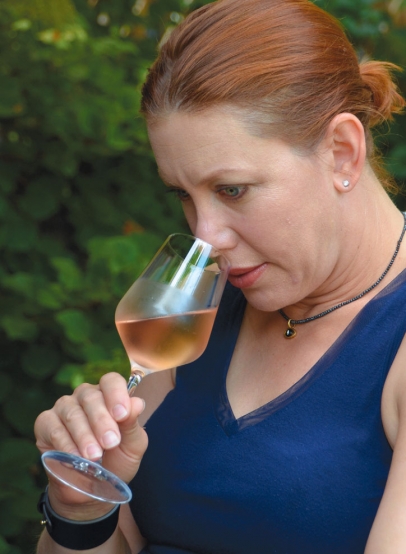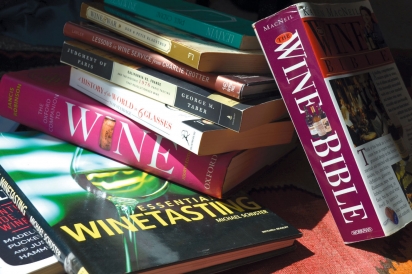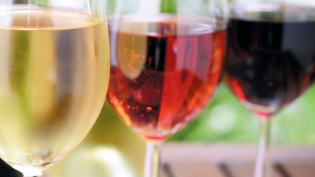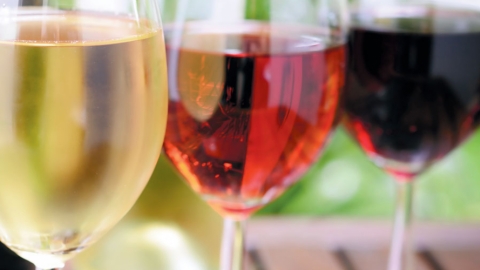Tasting, Terroir and Tutorials in TC
Traverse City and the two peninsulas that cradle this city have become home to some pretty impressive wineries and restaurants with award-winning wine lists. We’ve several wine shops with great selections of domestic, local and international wines. Add to this the breweries, cideries and distilleries popping up all over, and I see a truly marvelous modern mosaic of liquids to discover, understand, taste and share.
Visiting tasting rooms is fun—an excursion to share with friends and family. Yet sometimes you want to know more, to understand what you’re drinking, why it’s special, how to choose a wine or other beverage to go with a meal. Have you been curious as to why we can or can’t produce certain wines locally? Or why a certain wine tastes earthy or smells like watermelon candy? Or what “legs” and “viscosity” refer to? Or what acidity and tannins are? Perhaps you are unsure if the wine being proposed by a restaurant is really worth $150 a bottle? And, getting into the weeds, what to think of the fact that one of our local wineries has figured out how to grow the Nebbiolo grape here, when it is normally grown in the hotter Italian climate? Why is the Riesling grape such a big deal in Northern Michigan?
“Sadly, I don’t think we’ve done enough,” says Larry Mawby, owner and founder of L.Mawby Winery in Suttons Bay as we discussed wine education. “What we have been doing is to focus on our own products. We want to introduce people to our wines, and give them the information that they want, but we shy away from education because of the fear that people might feel they need to know more about wine to appreciate it. We want them to be reassured that they don’t need to know more than if they like what’s in their mouth. When they say, ‘I like your wine, tell me more,’ then we fall apart and don’t do a very good job of giving them more information to take home. We want to welcome people in a non-threatening way. You don’t need to know anything about sparkling wine to enjoy it.”
I was curious where one might learn about wine in our area. Who is teaching? Where? As I queried friends and colleagues, a few different players kept popping up. “Go spend a moment with Ric at Bon Vin, he gives very good advice. He’s always there and willing to tell you about his carefully curated selections of wines in every price point, particularly good Italian and French,” says Sharon Fletcher, of her neighborhood wine shop, a favorite with friends as far afield as Northport.
This past year, Ric Cerrini partnered with Raduno owners Andrea Deibler and Janene Silverman to offer a series of wine tasting events with their great food, for a minimal cost. “The first was after the holidays, that time of year when budgets are tight, so I did a group of my better wines for $15 and under. Then I did a tour of the South of France, following the Mediterranean Coast from South of Bordeaux, ending up in Provence. The third was my favorite, the unknown and underappreciated. And the last one was New World, West Coast, and I was able to get those folks involved, bring in distributors to talk about their wines. I’ve no idea where this will take me in the future. There’s so much more, so many things to discover and so many variables.”
Burritt’s Fresh Market offers weekly tastings with food for a small price. They also have a much-anticipated yearly fall wine sale, where vendors are present and throughout the wine shop tables are filled with dozens of bottles open to taste. This year’s dates are September 7–9.
Thus option one: As a layperson, we can go to our wine shops and taste the occasional bottle—on a regular day the shop is allowed by law to offer three 1.5-ounce tastes per client. Over time and many visits you can accumulate a certain level of wine appreciation, and hopefully a discerning palate. Additionally, take advantage of wine tasting events and get onto the mailing lists of the shops.
Dennis Fitzpatrick, longtime resident of Traverse City, former owner of the Wine Country Market wine shop where he used to hold private wine classes and currently a consultant on wines and wine lists throughout the region, tells me that he’s assisted a lot of restaurants by teaching their staff about wine. “I could bring enough to the table to bring up the standards at the restaurants so they could open, serve, explain the flavors and capably pair wine and food, which was so important.” In the late ‘90s he co-taught wine classes at Northern Michigan College with the late Mark Johnson of Chateau Chantal. Now that his son-in-law, Adam McMarlin, is buying Wren—formerly known as 9 Bean Rows restaurant—in Suttons Bay, Dennis is looking forward to teaching twice-monthly wine classes to the front-of-the-house staff, assisting them in deciding which wines to feature, and how to pair the wines with the dishes Adam prepares.
A few restaurants in our area have taken the step to establish a wine and beverage program for their staff. Guillaume Hazaël- Massieux, owner and chef of La Bécasse in Burdickville and Bistro Foufou in downtown Traverse City, works with his staff once a week throughout the spring, teaching them about French wine, geography, the AOC system, the top varietals and regions. He is quite aware that his impressive cellar of French wines will accompany his dishes only if they are presented capably by his staff. Though of course, there is always the occasional diner who knows exactly what the wines are and jumps at the chance to enjoy a bottle only previously read about, or tasted once before while traveling across France.
One person particularly stands out as devoted to the mission of transmitting knowledge on wine and beverage service: Amanda Danielson, co-owner of restaurants Trattoria Stella and The Franklin and, since last year, the wine and specialty shop The Blue Goat. I must divulge here, that I had the privilege of working at Stella’s for a year and a half, and thus was able to participate in Stella’s wine program. Amanda has put together a 40-week, 20-session syllabus of 90-minute classes that cover geography, grape varietals, the basics of tasting, blending and much more for her staff. As she says, “Teaching is amongst my first loves. And what a great platform wine, beer and spirits give. They include the study of history and geography, geology, going so far beyond agriculture and the business of it in what we do ... It isn’t just about the bottle of wine on the table; it’s about all the other things that have contributed to its eventually ending up at your table.”
A number of her staff go on to take the basic sommelier exam, and those with the spirit of adventure depart Traverse City to impress future employers in Chicago, Detroit, New York and beyond. Amanda’s course is rigorous and required participation for her front-of-house staff. Each year she builds on the year before, extending the knowledge base of her long-time staff and introducing new hires to her extensive and thoughtful beverage program.
“I teach master classes over there [Northwestern Michigan College], people pay me to teach, and I pay my staff to attend my classes here because I want them to have both an important knowledge base and comfort level table-side.”
And yes, it is an important budget line in the overall accounting for her restaurants.
This is the primary issue, along with time and high employee turnover, that prevents more of her colleagues from following her example. A dozen or so bottles of wine are opened per class (occasionally these are offered by distributors for this purpose), information sheets distributed, slide shows, guest visitors, meet the winemaker events, field trips to local wineries—the costs add up. But, with a wine list filled with top-quality wines from all over Italy, many from small family wineries featuring grapes and appellations little known to the restaurant-going public, Amanda has embraced the need to educate her staff to knowledgeably share, serve, storytell and introduce the wines to guests. A diner is far more likely to try an unknown or expensive bottle of wine when it is described knowledgeably and paired thoughtfully with their dish. Thus, Amanda’s investment in her staff and their wine and beverage education pays dividends, not only in wine sales at her restaurants, but also in a loyal staff who typically stay five to eight years before moving on: a level of employee retention rare in the industry.
Amanda has taught at NMC’s Culinary Institute, and the college has requested that she teach more regularly in their adult education program. But time is limited, and she is too busy to take on extra projects.
Our local wineries could be encouraged to support a wine teaching program. Mike Laing of Big Little Winery, and currently representing The Traverse Wine Coast that joins together Leelanau Peninsula and Old Mission Peninsula wineries to jointly market the region, agreed on the potential virtues of an off-season wine education program, perhaps in the form of weekend boot camps. “If someone else were spearheading a program, I would love to be involved. It’s a good idea. People are starting to care more and more about why people are making what they make and how.”
Mike has joined the conversation, along with Gary Jonas of The Little Fleet and others, to bring Better Drinking Culture to Traverse City, a movement aiming to shift the cultural perceptions of limits regarding alcohol consumption. The end goal would be to encourage better respect for alcohol and reduce overconsumption and binge drinking in order to focus on learning and enjoying without over-indulging.
For many of our local wineries, the winery bus tours have been a boon to their businesses. But there have also been too many occasions of rowdy groups going from tasting room to tasting room with the goal of drinking, not appreciating. And the result is disruptive and harms the atmosphere and experience for anyone else in the room. The party culture dominates a space, pushing aside the possibility of appreciating the improved quality of the local products and the major efforts of our local vintners, distillers and brewers to become world-class.
My research into where and how to learn more about wine in our area brings me full circle to my Wine Spectator subscription, bookshelf heavy in wine books, visiting wine shops regularly and sharing quirky bottles with friends. This is a good beginning, but wouldn’t it be wonderful to embrace our local wine and beverage production as more than a vacation destination and tourism hub? I can’t be the only person to believe we could benefit from serious wine instruction.







